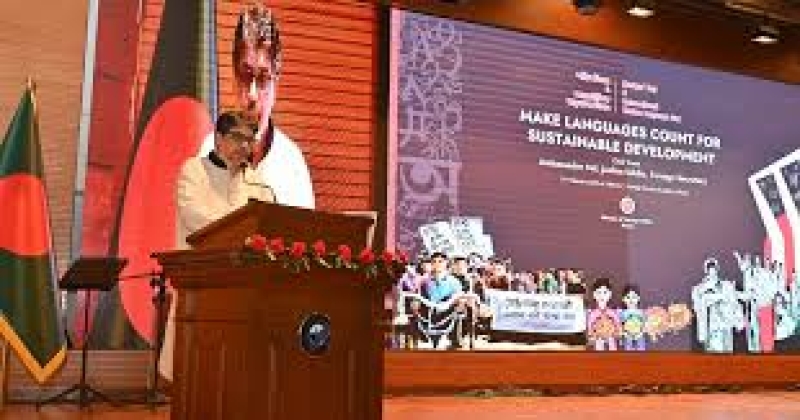- Irregularities, injustice will no longer be accepted in politics: Jamaat Ameer |
- 2 arrested in Jhenaidah for allegedly selling madrasa student |
- Koko’s wife campaigns for Tarique in Dhaka-17 |
- Bangladeshi Expats Cast 4.58 Lakh Postal Votes |
- IMF Forecasts Bangladesh GDP to Rebound to 4.7% in FY26 |
Foreign Ministry Commemorates International Mother Language Day

On Friday, the Ministry of Foreign Affairs hosted a significant event to commemorate both Martyrs’ Day and International Mother Language Day 2025, honoring the courageous language martyrs and the veterans of the language movement. The event took place at the Foreign Service Academy, where diplomats, UN representatives, and officials from international organizations gathered to pay their respects.
The program included a Provat Feri, a discussion session, a cultural performance, and an art exhibition featuring works by children. Foreign Secretary Md. Jashim Uddin delivered a powerful address, reflecting on the historic significance of ‘Amar Ekushe February’ (Immortal 21), a day that marks a crucial chapter in the nation’s struggle for language rights and independence.
“February 21st is a defining moment in our history,” said Uddin. “It not only symbolizes our fight for linguistic identity but also inspired the national movements that ultimately led to the independence of Bangladesh in 1971.”
This year also marks the 25th anniversary of International Mother Language Day, a day that has become a symbol of linguistic and cultural diversity worldwide. Uddin expressed deep gratitude to all those who contributed to the global recognition of this day in 1999.
The theme for this year’s International Mother Language Day, “Make languages count for sustainable development,” resonated strongly with Uddin, who highlighted its relevance to preserving cultural heritage and fostering intergenerational continuity. "Languages are the backbone of our identity, and we must invest in their future, particularly in the era of the Fourth Industrial Revolution," he said. "It is imperative that we develop and promote artificial intelligence, OCR software, and other digital tools in our mother tongue, Bangla."
In his remarks, the Foreign Secretary also paid tribute to the sacrifices made by the youth during the 1971 Liberation War, emphasizing that their fight paved the way for a future rooted in equality and justice. “On this historic day, we remember the vision they gave us – an opportunity to build a better, more inclusive Bangladesh,” he said.
Uddin also affirmed the commitment of the Interim Government, led by Chief Advisor Dr. Muhammad Yunus, to continue upholding the values of unity, equality, and respect for all linguistic and cultural identities. He stressed the government's ongoing efforts to promote multilingualism, preserve endangered languages, and ensure that linguistic diversity remains a cornerstone of Bangladesh’s cultural landscape.
The event served as a reminder of the enduring significance of language as both a cultural treasure and a key to sustainable development in an interconnected world.

